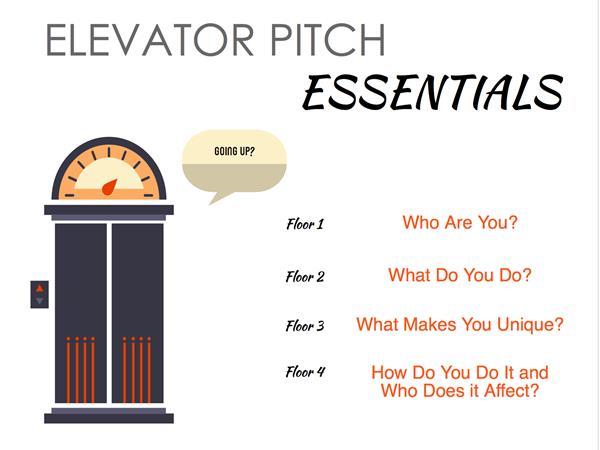Five Tips on Crafting the Perfect Elevator Pitch
In
our last #SoftSkills post, we mentioned the importance of having an
impressive elevator pitch. In this post we will cover the basics of
an elevator pitch and how to perfect yours.
An
elevator pitch is a succinct statement of purpose. Companies,
institutions and individuals all have elevator pitches that allow
them to explain exactly what they do and what they are looking for in
the future in a brief 20-60 second time span. For individuals, this
usually falls under the “tell me a bit about yourself” portion of
an interview.
Why
is this important?
In
India, we have a crisis in the soft skills department. Students are
taught how to do complex trigonometry in twelfth grade, but not how
to network or communicate effectively. As a consequence, come
interview time, freshers end up totally blank when they are asked to
talk about themselves. This is where the elevator pitch comes in.
With a pre prepared template with what to highlight about yourself in
a short time frame, the anxiety surrounding the first question in
most interviews becomes much less.
Read
on for five tips on how to perfect yours.
- Be specific: Your basic elevator pitch should have only information that reveals something unique or interesting about you. While you may have lots of interests and strengths, an elevator pitch should focus only on those that are relevant to the field you are in or to the work you wish to do. For example, if you want to go into finance, talking about how you were captain of your college football team (although certainly impressive) might be a lot less relevant than the fact that you were involved in your college investment club.
- Focus on what you DO rather than just listing achievements: It is tempting to treat your elevator pitch as a resume. Not a great idea. Think of it this way: if you were to meet someone new, would you be more interested in the five awards they won in college or what they did to win them? Boil down your elevator pitch to make it 80% work and 20% results. Therefore, a good elevator pitch for a marketing job would focus less on your GPA/ unrelated achievements and more on the experience you have and strategies you expect to use to expand a potential client’s market base.
- Show, don’t tell: If you are an efficient worker who has great interpersonal skills, don’t feel shy about saying so. Just remember that any claim you make about your skills and abilities should always be backed up by evidence. For example, saying “I am a great writer” sounds cocky. Instead, saying “I have x years of writing experience and have my own blog that I update every week”, sounds like you are passionate about what you do and have experience to back up your skill.
- Practice in front of a mirror/ with new people you meet: Once you’ve created a coherent elevator pitch, it’s a good idea to practice it (with a timer!) in front of a mirror and, eventually, with new people you meet. The goal is to enhance not just the pitch itself, but also its delivery- body language, eye contact and pace. Remember to slow yourself down so you don’t just rattle off the pitch as if rehearsed.
- Know how to answer follow up questions: Finally, make sure you have something to say if asked about a specific part of your pitch. It’s easy to get so caught up in delivering your elevator pitch right that you forget to treat it as a conversation rather than a declamation. Don’t make this mistake! Have an answer for questions that might come up as a natural response to your pitch and, unless it’s in an interview setting, make sure to ask questions of the other person as well!
Here’s
an example of a great elevator pitch in response to the common
interview question “tell me a little bit about yourself”:
I
am a freelance writer and blogger who writes on the Middle East and
economic instability. I have been published in the Times of India, HT
and in my campus newspaper. I just graduated with honors in political
science and am looking to work at an international organization on
foreign affairs and policy. I’ve interned at a XYZ organization,
working as a content writer and social media liaison for their
poverty alleviation project. In my three months there, I managed to
increase the number of views on their webpage by over 60%. I am
confident I can do similar work at your organization.
This elevator pitch works for many reasons. Firstly, it is very specific and to the point. The speaker mentions relevant work and academic experience while excluding anything that doesn’t add to their profile. Secondly, the speaker offers evidence of their abilities rather than simply saying they are a good writer or policy professional. Finally, the speaker ends on a positive note, explaining how their previous experiences can be useful to a potential employer. All this combined with impressive soft skills (body language, eye contact, pace), would make the speaker an impressive candidate for the job of their choice!


IEEE Final Year projects Project Centers in Chennai are consistently sought after. Final Year Students Projects take a shot at them to improve their aptitudes, while specialists like the enjoyment in interfering with innovation. For experts, it's an alternate ball game through and through. Smaller than expected IEEE Final Year project centers ground for all fragments of CSE & IT engineers hoping to assemble. Final Year Projects for CSE It gives you tips and rules that is progressively critical to consider while choosing any final year project point.
ReplyDeleteSpring Framework has already made serious inroads as an integrated technology stack for building user-facing applications. Spring Framework Corporate TRaining the authors explore the idea of using Java in Big Data platforms.
Specifically, Spring Framework provides various tasks are geared around preparing data for further analysis and visualization. Spring Training in Chennai
The Angular Training covers a wide range of topics including Components, Angular Directives, Angular Services, Pipes, security fundamentals, Routing, and Angular programmability. The new Angular TRaining will lay the foundation you need to specialise in Single Page Application developer. Angular Training